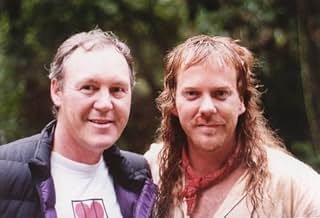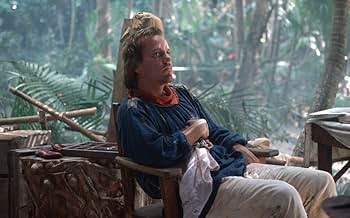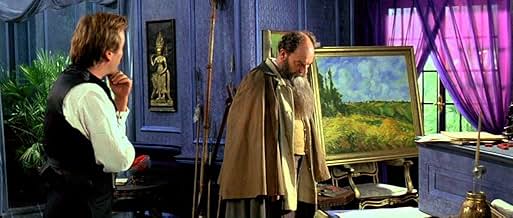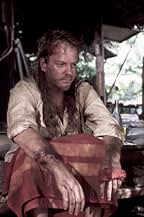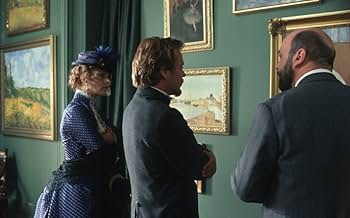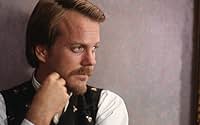Aggiungi una trama nella tua linguaA successful 19th century French stockbroker (Sutherland) leaves his profession to become an artist in Paris.A successful 19th century French stockbroker (Sutherland) leaves his profession to become an artist in Paris.A successful 19th century French stockbroker (Sutherland) leaves his profession to become an artist in Paris.
- Regia
- Sceneggiatura
- Star
Jana Bittnerová
- Suzanne
- (as Jana Bittnerova)
Recensioni in evidenza
An absolutely dreadful rendition of Gauguin's life on Tahiti.There is no sense of his passion in a wonderful adventure in the South Seas and the real difficulties he faced.Having studied this painters life in some detail I find this biopiic unbelievably innacurate. We even have his wife Mette loving his paintings from Tahiti, which in reality she despised. There is even a scene of her at his exhibition in Paris, an event she refused to attend.She never appreciated any of his work. If a filmmaker or writer embarks on a biopic picture they need to keep the basic facts correct. The Directing and editing is very slow and not very entertaining. It is difficult to blame the actors with such a pedestrian script but I found the casting quite misguided. Gauguin must be quaking in his grave at this effort at portraying his brave and noble life in pursuit of his art.
A romanticized look at Paul Gauguin's foray into post-impressionism in the late 1880's. As written by screenwriter John Goldsmith, Gauguin doesn't have a great deal happen in his life, cinematically. He gives up his brokerage job to paint, goes to Martinique, returns to France to become a leading artist in the new movement. Spends two years in Tahiti where he paints the islanders to critical acclaim. Back in Paris, he ruminates a few more years before returning to the South Seas for good.
Kiefer Sutherland does his best as Gauguin but can do little against a pedestrian plot. We see only a shade of the pain and frustration of an artist driven to create but unable to overcome a painters block. As a result, we cannot share in the exhilaration he feels when finally he achieves his goal. His wife, played by Nastassja Kinski, runs hot and cold to her husband's career choices and while she provides drama, does little to solicit our sympathy.
The narrative construction is not linear, which is unfortunate. We are constantly being thrust backwards and forwards in time which means constant mental adjustment and readjustment on the part of the audience. Not a good formula for success for a film of this calibre.
Viewed at the American Film Market in February.
Kiefer Sutherland does his best as Gauguin but can do little against a pedestrian plot. We see only a shade of the pain and frustration of an artist driven to create but unable to overcome a painters block. As a result, we cannot share in the exhilaration he feels when finally he achieves his goal. His wife, played by Nastassja Kinski, runs hot and cold to her husband's career choices and while she provides drama, does little to solicit our sympathy.
The narrative construction is not linear, which is unfortunate. We are constantly being thrust backwards and forwards in time which means constant mental adjustment and readjustment on the part of the audience. Not a good formula for success for a film of this calibre.
Viewed at the American Film Market in February.
Being the die hard Sutherland fan that I am, I enjoyed this flick purely for his performance. The film is rather superficial and slow-moving, but there is quite a bit of power behind Sutherland's performance, which makes it worth the while of those who just need more of Kiefer. I can't say I'd watch this film again, but I appreciate the emotional investment that the actors put into it. A six out of ten.
Paradise Found (2003)
Paul Gauguin is a great artist, and his work is daring and beautiful. So whenever the movie lets the work show through--and it does several times--it rises to its best. And the man playing the artist, improbable as it is, is Kiefer Sutherland, who does a decent job. It's hard to say to what extent he is true to the real man--how can anyone know?--but he combines intensity and craziness in good measure.
And, to keep on the good notes, it's actually not so bad how German-born Nastassjia Kinski handles the Danish wife of Gauguin, Mette-Sophie. Several other characters make brief appearances, the one most famous is Pissarro played by Alun Armstrong, who I didn't know, but who is strong enough at making the Impressionist slightly out of touch with the changing tides of art. In fact, what the movie does accomplish is show some sense of the art scene in Paris from Gauguin's point of view, and Gauguin's friendship with Pissarro as a catalyst to his becoming a serious artist.
The story is told in interspersed flashbacks, which are distracting and almost arbitrary. It begins with Gauguin's arrival in Tahiti, then jumps back 17 years to Paris, then to Tahiti, back and forth uncountable times. And without reason, except to chop the movie up, as if a chronological telling would be dull.
More troubling is the depiction of Tahiti (and other islands in French Polynesia). It plays loose with facts. Historically, the islands were largely ruined and in disease from the colonists, not the idyllic paradise shown here, infested with a handful of soldiers and an excessively zealous Christian missionary. The struggle of the islanders to preserve their religious icons is overemphasized, and the struggle of Gauguin to land women and young girls for sex is underemphasized. He's passionate and troubled, broke and dirty. That is, he's an artist, through and through.
So it gets a bit tiring. And in fact, between all the little eruptions of energy and conflicting emotions, very little happens, really happens. And it's filmed plainly, to the point of being dull, cutting from person to person in conversation as if by formula. The sets are well done and sometimes quite beautiful, and they should have inspired a more intense visual approach. As the paintings themselves should have, too.
Paul Gauguin is a great artist, and his work is daring and beautiful. So whenever the movie lets the work show through--and it does several times--it rises to its best. And the man playing the artist, improbable as it is, is Kiefer Sutherland, who does a decent job. It's hard to say to what extent he is true to the real man--how can anyone know?--but he combines intensity and craziness in good measure.
And, to keep on the good notes, it's actually not so bad how German-born Nastassjia Kinski handles the Danish wife of Gauguin, Mette-Sophie. Several other characters make brief appearances, the one most famous is Pissarro played by Alun Armstrong, who I didn't know, but who is strong enough at making the Impressionist slightly out of touch with the changing tides of art. In fact, what the movie does accomplish is show some sense of the art scene in Paris from Gauguin's point of view, and Gauguin's friendship with Pissarro as a catalyst to his becoming a serious artist.
The story is told in interspersed flashbacks, which are distracting and almost arbitrary. It begins with Gauguin's arrival in Tahiti, then jumps back 17 years to Paris, then to Tahiti, back and forth uncountable times. And without reason, except to chop the movie up, as if a chronological telling would be dull.
More troubling is the depiction of Tahiti (and other islands in French Polynesia). It plays loose with facts. Historically, the islands were largely ruined and in disease from the colonists, not the idyllic paradise shown here, infested with a handful of soldiers and an excessively zealous Christian missionary. The struggle of the islanders to preserve their religious icons is overemphasized, and the struggle of Gauguin to land women and young girls for sex is underemphasized. He's passionate and troubled, broke and dirty. That is, he's an artist, through and through.
So it gets a bit tiring. And in fact, between all the little eruptions of energy and conflicting emotions, very little happens, really happens. And it's filmed plainly, to the point of being dull, cutting from person to person in conversation as if by formula. The sets are well done and sometimes quite beautiful, and they should have inspired a more intense visual approach. As the paintings themselves should have, too.
Can anyone tell me of another film on Gauguin's life? While not as passionate as Lust for Life (van Gogh), I enjoyed seeing Paradise Found, and I saved it & have watched it several times now. I wanted it to go on longer.
In my 30s I painted several oils, & seeing this has inspired me to get out my brushes again. I wish more artists lives were available. William Blake, Turner, and others. PF was made by Australians, & I bet Hollywood would have changed the story line even more.
In my 30s I painted several oils, & seeing this has inspired me to get out my brushes again. I wish more artists lives were available. William Blake, Turner, and others. PF was made by Australians, & I bet Hollywood would have changed the story line even more.
Lo sapevi?
- QuizKiefer Sutherland's father, Donald Sutherland, also portrayed the artist Paul Gauguin in the film La vita di Gauguin (1986).
- BlooperPissarro is misspelled "Pissaro" in the closing credits (but spelled correctly in the DVD captions).
- Citazioni
Paul Gauguin: I have some advice of my own: you'd best mind your own fucking business.
- ConnessioniVersion of Il sogno di Tahiti (1980)
I più visti
Accedi per valutare e creare un elenco di titoli salvati per ottenere consigli personalizzati
- How long is Paradise Found?Powered by Alexa
Dettagli
- Data di uscita
- Paesi di origine
- Lingua
- Celebre anche come
- Gauguin: Diario de un genio
- Luoghi delle riprese
- Aziende produttrici
- Vedi altri crediti dell’azienda su IMDbPro
Botteghino
- Budget
- 10.000.000 A$ (previsto)
- Tempo di esecuzione
- 1h 33min(93 min)
- Colore
- Mix di suoni
- Proporzioni
- 2.35 : 1
Contribuisci a questa pagina
Suggerisci una modifica o aggiungi i contenuti mancanti


